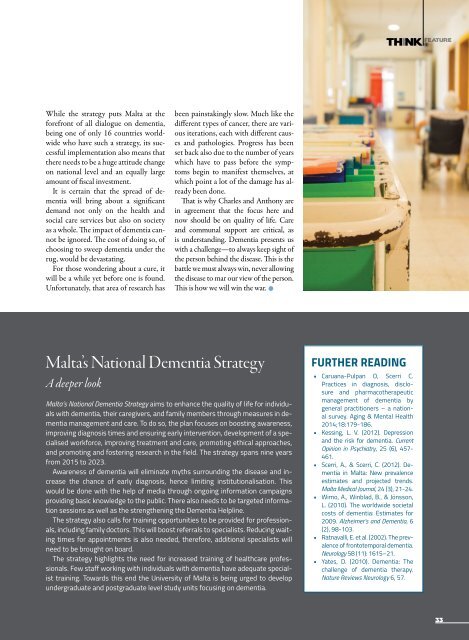Create successful ePaper yourself
Turn your PDF publications into a flip-book with our unique Google optimized e-Paper software.
THINK Feature<br />
While the strategy puts Malta at the<br />
forefront of all dialogue on dementia,<br />
being one of only 16 countries worldwide<br />
who have such a strategy, its successful<br />
implementation also means that<br />
there needs to be a huge attitude change<br />
on national level and an equally large<br />
amount of fiscal investment.<br />
It is certain that the spread of dementia<br />
will bring about a significant<br />
demand not only on the health and<br />
social care services but also on society<br />
as a whole. The impact of dementia cannot<br />
be ignored. The cost of doing so, of<br />
choosing to sweep dementia under the<br />
rug, would be devastating.<br />
For those wondering about a cure, it<br />
will be a while yet before one is found.<br />
Unfortunately, that area of research has<br />
been painstakingly slow. Much like the<br />
different types of cancer, there are various<br />
iterations, each with different causes<br />
and pathologies. Progress has been<br />
set back also due to the number of years<br />
which have to pass before the symptoms<br />
begin to manifest themselves, at<br />
which point a lot of the damage has already<br />
been done.<br />
That is why Charles and Anthony are<br />
in agreement that the focus here and<br />
now should be on quality of life. Care<br />
and communal support are critical, as<br />
is understanding. Dementia presents us<br />
with a challenge—to always keep sight of<br />
the person behind the disease. This is the<br />
battle we must always win, never allowing<br />
the disease to mar our view of the person.<br />
This is how we will win the war.<br />
•<br />
Malta’s National Dementia Strategy<br />
A deeper look<br />
Malta’s National Dementia Strategy aims to enhance the quality of life for individuals<br />
with dementia, their caregivers, and family members through measures in dementia<br />
management and care. To do so, the plan focuses on boosting awareness,<br />
improving diagnosis times and ensuring early intervention, development of a specialised<br />
workforce, improving treatment and care, promoting ethical approaches,<br />
and promoting and fostering research in the field. The strategy spans nine years<br />
from 2015 to 2023.<br />
Awareness of dementia will eliminate myths surrounding the disease and increase<br />
the chance of early diagnosis, hence limiting institutionalisation. This<br />
would be done with the help of media through ongoing information campaigns<br />
providing basic knowledge to the public. There also needs to be targeted information<br />
sessions as well as the strengthening the Dementia Helpline.<br />
The strategy also calls for training opportunities to be provided for professionals,<br />
including family doctors. This will boost referrals to specialists. Reducing waiting<br />
times for appointments is also needed, therefore, additional specialists will<br />
need to be brought on board.<br />
The strategy highlights the need for increased training of healthcare professionals.<br />
Few staff working with individuals with dementia have adequate specialist<br />
training. Towards this end the University of Malta is being urged to develop<br />
undergraduate and postgraduate level study units focusing on dementia.<br />
FURTHER READING<br />
• Caruana-Pulpan O, Scerri C.<br />
Practices in diagnosis, disclosure<br />
and pharmacotherapeutic<br />
management of dementia by<br />
general practitioners – a national<br />
survey. Aging & Mental Health<br />
2014;18:179-186.<br />
• Kessing, L. V. (2012). Depression<br />
and the risk for dementia. Current<br />
Opinion in Psychiatry, 25 (6), 457-<br />
461.<br />
• Scerri, A., & Scerri, C. (2012). Dementia<br />
in Malta: New prevalence<br />
estimates and projected trends.<br />
Malta Medical Journal, 24 (3), 21-24.<br />
• Wimo, A., Winblad, B., & Jönsson,<br />
L. (2010). The worldwide societal<br />
costs of dementia: Estimates for<br />
2009. Alzheimer’s and Dementia, 6<br />
(2), 98-103.<br />
• Ratnavalli, E. et al. (2002). The prevalence<br />
of frontotemporal dementia.<br />
Neurology 58 (11): 1615–21.<br />
• Yates, D. (2010). Dementia: The<br />
challenge of dementia therapy.<br />
Nature Reviews Neurology 6, 57.<br />
33


